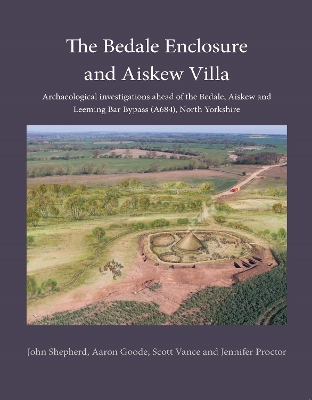Pre-Construct Archaeology monograph
1 primary work
Book 25
The Bedale Enclosure and Aiskew Villa
by John Shepherd, Aaron Goode, - Scott Vance, and Jenny Proctor
Published 15 October 2022
In 2015 construction of a new road that bypassed the modern towns of Bedale, Aiskew and Leeming Bar began. It was anticipated that an enclosure of pre-Roman date , lay on the route of the new road near Bedale, but the site of a hitherto unknown Roman villa near Aiskew was also located. Coincidentally, both the enclosure and the villa were situated alongside a routeway that ran on slightly higher ground above local floodplains; this was exactly the same route that the modern road took.
The initial construction of the Bedale enclosure could be dated to the Middle Iron Age but well-preserved ditch deposits showed a number of substantial recuttings of the ditch. The final infilling deposits included Roman material dating up to the latter part of the second century. The adjacent routeway, as excavated, belonged to this later phase of activity but there was evidence for an earlier precursor.
The Aiskew villa, dating mainly to the third and fourth centuries, was only partially examined; geophysics demonstrated that the complex covered a much larger area and included many other structures. The excavated rooms were very well-appointed, with good quality wall plaster. One heated room was added at a later date. Beyond the villa was perimeter ditch, the boundary of the villa complex itself, and field systems. Finds from these demonstrate a high-quality lifestyle befitting elite owners. Precisely who these elites were is open to debate but the proximity of contemporary military camps to the west and key settlements alongside Dere Street to the east place this villa in a most convenient location for access to both.
The initial construction of the Bedale enclosure could be dated to the Middle Iron Age but well-preserved ditch deposits showed a number of substantial recuttings of the ditch. The final infilling deposits included Roman material dating up to the latter part of the second century. The adjacent routeway, as excavated, belonged to this later phase of activity but there was evidence for an earlier precursor.
The Aiskew villa, dating mainly to the third and fourth centuries, was only partially examined; geophysics demonstrated that the complex covered a much larger area and included many other structures. The excavated rooms were very well-appointed, with good quality wall plaster. One heated room was added at a later date. Beyond the villa was perimeter ditch, the boundary of the villa complex itself, and field systems. Finds from these demonstrate a high-quality lifestyle befitting elite owners. Precisely who these elites were is open to debate but the proximity of contemporary military camps to the west and key settlements alongside Dere Street to the east place this villa in a most convenient location for access to both.
